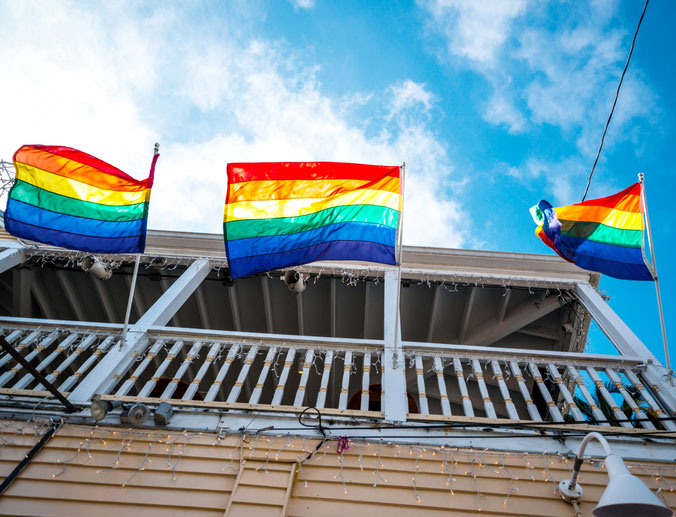Written by Scott Wilson
In some ways it all started in early 2022 when House Bill 1557 passed both the Florida House and Senate and was signed into law by Governor DeSantis. The bill, formally titled, the Parental Rights in Education Act, had already acquired its popular name by then: “Don’t Say Gay.”
The stated purpose of the Don’t Say Gay law was to “prohibit classroom discussion about sexual orientation or gender identity in certain grade levels or in a specified manner.”
A charming addition to the following year’s HB 1069, which prohibited the use of pronouns inconsistent with biological sex assigned at birth, and requiring any sexual education to disregard the concept that gender may be fluid. It also allows anyone in the school district to object to any material in a classroom or school library that describes sexual content in any manner, with the default result being automatic removal.
Yet the greatest threat for social workers was the uncertainty. People just flat out couldn’t understand what it required—even the authors. Lengthy debates over the exact meaning of the text ensued, both in the public sphere and within school administration buildings.
Some of that ambiguity was removed through the recent settlement of a lawsuit against the state… But does that mean that social workers CAN say gay again in Florida schools?
Repression Sparked Lawsuits that Helped Clarify Language in the Don’t Say Gay Bill
Individuals and groups including Equality Florida and Family Equality almost immediately sued in federal court over the restrictions put in place by HB 1557. The complaint ping-ponged through the legal system for a couple of years, disputing the constitutionality of the law’s provisions as well as calling out the lack of clarity in the rules.
Ultimately, both the state and the plaintiffs entered negotiations outside the courtroom. They decided to settle the suit rather than continue with years of sparring in court.
A settlement reached in early 2024 changed the landscape around the Florida Parental Rights in Education Act, but didn’t repeal it.
According to assertions made by the state under the terms of the agreement, Florida schools can allow:
- Teachers to respond to students who bring up the subject of their own families or gender identities, and may grade papers that discuss LGBTQ topics as long as those topics were not assigned
- Teachers may refer to LGBTQ characters from literature or film, or to the sexual preferences of historical figures
- Students can discuss LGBTQ issues among themselves and engage in classroom debates on those topics
- Anti-bullying policies and protection are allowed to explicitly acknowledge LGBTQ students
- Students can wear clothes commonly worn by a gender not assigned to them at birth, and students may dance with others of the same gender at school dances
Of course, to the average educated social worker, this doesn’t sound like much of a victory. On top of that, all the basic educational restrictions continue to apply. The rules of HB 1069 weren’t even challenged.
Simply Clarifying a Troubling Law Doesn’t Offer Much of an Improvement

The “Don’t Say Gay” mantra was always a simplification of the actual law. But part of the problem in the first place was that the law itself was too vague to be simplified—no one, including the authors, could specify exactly what sort of language could or could not be used in the classroom.
In many ways, this was always the point: rather than offering clear guidance that educators could understand, the law is designed to instill fear of retribution in anyone deemed subversive in some way. Like vagrancy laws that criminalize things like sitting on city streets, it was created to offer a general purpose tool that authorities could use at their discretion, not a bright-line regulation that everyone could be followed. Language like “certain grade levels” and “in a specified manner” left nothing but gray area.
In that sense, the settlement has changed very little. While both sides are proclaiming a sort of victory, educators are being left with little more than a list of arguments that the state made in court to defend the provisions of the statute. No actual changes to the law were made; no case law was established to settle arguments; no promises were made by the state to not make other arguments or assert other restrictions under the law.
In the meantime, the very real impacts of the law have not been rolled back. The fact that students were told they couldn’t mention that they were gay in commencement speeches had a chilling effect that is hard to measure. Gay teachers who quit their positions aren’t coming back to districts that wouldn’t defend them. An irreparable blow has been made, one that leaves educators and school social workers trying to pick up the pieces.
Students Pay the Ultimate Price When Unjust Laws Are Passed for Schools
 That’s because students still bear the brunt of the intended restrictions, and they know it. No clarification changes the core message: the very thing that they are is unwanted and unacceptable to the powers that be.
That’s because students still bear the brunt of the intended restrictions, and they know it. No clarification changes the core message: the very thing that they are is unwanted and unacceptable to the powers that be.
This shows up clearly in a recent analysis by the Washington Post of FBI crime data. The paper found that hate crimes in schools quadruple in states that have passed restrictive laws on LGBTQ+ rights and education.
For gay students, or even just those who aren’t quite settled into themselves yet, it’s open season for bullying and ostracism in Florida, with or without the Don’t Say Gay settlement.
School social workers and youth and family social workers, particularly LCSWs who are licensed and trained to deliver mental health counseling, have to do their best to reassure these kids that it gets better. But social workers, too, could use some reassurance that things will get better because their own profession is in the crosshairs, as well.
How Educational Restrictions May Start to Impact Social Work Education in Florida
While the landscape has been slightly adjusted for school social workers dealing with primary and secondary students, there’s a larger and more long-term set of considerations for university-level instructors in social work—and any student seriously considering earning a social work degree in Florida.
Florida Senate Bill 266 passed into law in 2023 with less fanfare than HB1557. Although watered down from the initial version, it restricts certain subjects from being taught in general education courses… including the teaching of “…theories that systemic racism, sexism, oppression, and privilege are inherent in the institutions of the United States and were created to maintain social, political and economic inequities.”
The concern is that CSWE-accredited social work degree programs are all but required to teach those theories, in line with both the history and current reality of racial oppression in the United States.
The state of Florida itself requires that you earn a Master of Social Work degree that meets CSWE-curriculum standards to qualify for licensure—a contradiction that SB 266 didn’t appear to consider.
Again, it’s the ambiguity that is the issue. Both university administrators and some state legislators claim that specific types of courses and topics required for specialized social work training won’t be affected. But social work college instructors have doubts. They can see the intent of the law and know the history of such laws. Any gray area can be used against them—and they are likely to lean toward excluding topics like Critical Race Theory from their courses, just in case.
Florida Is the Battleground When It Comes to Ensuring the Right to a Full and Fair Education in Social Work

While the recent settlement draws a line under some very specific applications of law in lower grades, it did nothing to signal that the even broader considerations of critical race theory, diversity, equity, and inclusion that social workers must learn at the collegiate level are back on the menu.
Although any victory over the oppressive forces that are attempting to take Florida back into the Dark Ages is welcome, social workers here recognize that there is much left to be done. Efforts to roll back the state’s desire to define individuals and restrict education to a narrow pseudo-religious template will likely go on for years.
But Florida’s social justice community is up to the task. Even as SB 266 was being signed, a group of faculty members, students, and the nonprofit New College of Florida Freedom organization were filing suit in U.S. District Court over the restrictions. Another legal battle is brewing… social workers aren’t shrinking from the fight.

